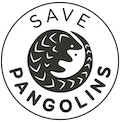Today is World Pangolin Day – a time to celebrate some of nature’s most unique and loveable animals. But it is also a day for action. The desire for their meat and scales is driving pangolins to extinction, right when many people around the world are only just discovering they exist. If we don’t come together – online and in the real world – we stand to lose an animal that has been on this planet for 80 million years.
Pangolins are gentle, insect-eating mammals about the size of a house cat. They have long faces with no teeth and a sticky tongue that is longer than the length of its body when unfurled. Each pangolin can devour up to 70 million insects per year by some estimates.
A Sunda pangolin in Vietnam. © Suzi Eszterhas
There are eight species of pangolin – four in Asia and four in Africa. Some climb trees using prehensile tails. Others use their strong limbs and long claws to dig burrows underground. They are nocturnal, secretive, and they are disappearing.
It is their most unique trait that is also their biggest threat. Their bodies are covered in overlapping scales – think of a walking pinecone. The scales have long been used as an ingredient in traditional medicine in east Asia. And although it is believed pangolin scales can treat a variety of ailments, there has yet to be any scientific backing to substantiate this. In fact, pangolin scales are made of keratin, the same protein that makes up human fingernails.
Pangolins are timid, which makes them both difficult for researchers to study in the wild, and also susceptible to poachers. They roll up into a ball when frightened, and while their armor-like scales protect them from predators – even lions – they are powerless when hunters stuff them into sacks and ship them alive, ready for transport in their natural scaly packaging.
Pangolins are shipped through a global network of illegal wildlife traffickers, destined for mainly Chinese pharmacies and restaurants, where the consumption of their meat and scales is considered a luxury and demonstration of wealth.
As a result, the levels of illegal pangolin shipments is staggering. IUCN’s SSC Pangolin Specialist Group estimates that since 2012 more than 20,000 kg of scales from African pangolins bound for Asia have been seized, which translates to somewhere between 5,000 and 30,000 pangolins. One record-breaking seizure, by Hong Kong officials in June of last year, consisted of 4.4 tons of pangolin scales. The shipment originated from Cameroon and we estimate it contained up to 6,600 pangolins.
That is just the tip of the iceberg. We do not know how many illegal shipments make it past officials each year. At this pace, the future of the gentle pangolin does not look good.
But there is hope.
An emerging field of pangolin conservationists is working to stop the killing, the trafficking, and the demand for pangolins. In September, pangolins gained the highest levels of protection under CITES with the decision to uplist all 8 species to Appendix I. Now, international commercial trade in all 8 species of pangolins is prohibited, and members of the IUCN-SSC Pangolin Specialist Group, which we were proud to help reform in 2012, are leading pangolin conservation efforts around the world.
With increasing trafficking targeting African pangolins, there are emerging efforts to train and equip pangolin conservationists in Central Africa. MENTOR POP (Progress for Pangolins) is an international effort to build capacity within Central Africa to combat the pangolin trade there. Funded by the U.S. Fish and Wildlife Service and hosted by the Zoological Society of London, MENTOR POP is changing the story of pangolins in Central Africa, and we are proud to partner with this program.
Public awareness is growing too. When Save Pangolins was founded in 2007, we created the first website dedicated to pangolins, which was the only one at the time. Since then, the pangolin trafficking crisis has been highlighted by the BBC, CNN, The New York Times, and Google. Perhaps you saw the wonderful Google Doodle during Valentine’s Day which spread #pangolinlove and introduced pangolins to an even wider audience.
But our work has only just begun and it will require a global effort.
You can get involved today on World Pangolin Day by spreading the word about pangolins. Please join us in keeping the #pangolinlove alive not just today but throughout the year. Tell people about pangolins. Show them photos and videos. Share this post. Write your own ode to pangolins. And if you can, make a donation to the emerging pangolin conservation efforts. Together, we can save pangolins from extinction.






















